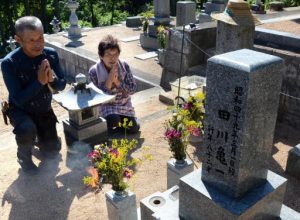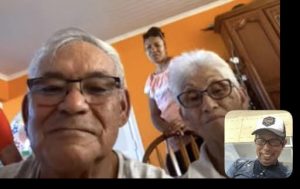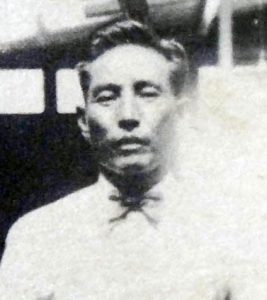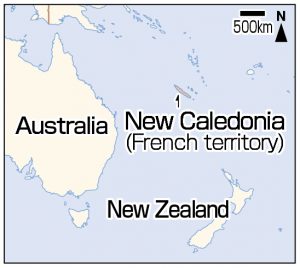Family torn apart by WWII—grandchildren in New Caledonia and nephew in Shobara, Hiroshima—meet on internet for first time 75 years after end of war
Aug. 15, 2020
by Michiko Tanaka, Staff Writer
This summer, members from two families unaware of each other’s existence despite their kinship finally had a chance to meet by internet telephone. Those speaking together were Robert Tagawa, 71, a resident of New Caledonia, an archipelago in the South Pacific Ocean that is a dependent overseas territory of France, and Tomonori Tagawa, 78, a resident of the district of Tojo-cho in Shobara City, Hiroshima Prefecture. Immediately after the war in the Pacific broke out, Kameichi Tagawa, Robert’s now deceased grandfather, was detained as an enemy alien and ousted from New Caledonia, to which he had immigrated. As a result, Kameichi was separated from his local family. Seventy-five years since the end of World War II, the two men renewed the ties of kinship that were tossed about by the vagaries of war.
On August 14, Tomonori visited Kameichi’s grave near his home. He was able to report, as he placed his hands together in prayer before the tomb, “Your grandchildren are living happily in New Caledonia.”
On August 2, Robert and Tomonori met via their computers. In an excited voice on screen, Robert said that being able to speak with his grandfather’s family in Japan was like a dream come true. He added he finally was able to gain peace of mind after struggling to identify his true origins. The two men promised that, after the coronavirus pandemic ends, they would visit Kameichi’s grave together.
Robert has persisted in tracing the whereabouts of his late grandfather, who he had never met in person. He sought help from Hiramatsu Ireland Benjamin, 30, assistant professor at Texas Christian University in the United States, who studies Japanese immigrants in the Asia/Pacific region. In July, Robert discovered that Tomonori lived in Shobara.
Kameichi’s life was full of hardship. New Caledonia, now a popular tourist spot, was a destination for more than 5,000 Japanese immigrants who traveled to the archipelago during the Meiji and Taisho periods to work in nickel mines. Kameichi was one of those immigrants. He headed to the island of New Caledonia from his home (now part of Tojo-cho) when he was 21 years old in 1914. After working in the mines, he managed a retail shop, married a local woman, and fathered an only son.
Kameichi’s life took a turn for the worse in December 1941, 27 years after he had immigrated. As Japan and the United States began to engage in the war, Japanese residents were detained by French authorities and their assets confiscated. Not a few were sent to concentration camps and separated from their families. Kameichi, then 48, was unable to avoid such a fate and was sent back to Japan in 1942.
In 1953, Kameichi’s only son died in an accident at sea. His two children, Robert and Geneva, 72, Robert’s older sister, remained. The only clue the two of them had of Kameichi was a letter he had written to his family from one of the concentration camps.
Meanwhile, Tomonori remembers Kameichi as a smart uncle who worked in the research department for a local steel company after he had returned to his hometown in 1943. Kameichi remarried when he was 55 and died at the age of 80 in 1974.
After the end of the war, Kameichi never revisited the island where he used to live and was reluctant to talk about his life there. But when Tomonori was very young, Kameichi showed him a photograph of his wedding ceremony on the island. Tomonori said, “I assume he missed his family in New Caledonia. He probably would have had a different life had the war not occurred.” In the summer of the 75th anniversary of the end of the war, Tomonori appeared to wonder about the distress felt by his uncle’s family, which had been torn apart by the war.
(Originally published on August 15, 2020)
This summer, members from two families unaware of each other’s existence despite their kinship finally had a chance to meet by internet telephone. Those speaking together were Robert Tagawa, 71, a resident of New Caledonia, an archipelago in the South Pacific Ocean that is a dependent overseas territory of France, and Tomonori Tagawa, 78, a resident of the district of Tojo-cho in Shobara City, Hiroshima Prefecture. Immediately after the war in the Pacific broke out, Kameichi Tagawa, Robert’s now deceased grandfather, was detained as an enemy alien and ousted from New Caledonia, to which he had immigrated. As a result, Kameichi was separated from his local family. Seventy-five years since the end of World War II, the two men renewed the ties of kinship that were tossed about by the vagaries of war.
On August 14, Tomonori visited Kameichi’s grave near his home. He was able to report, as he placed his hands together in prayer before the tomb, “Your grandchildren are living happily in New Caledonia.”
On August 2, Robert and Tomonori met via their computers. In an excited voice on screen, Robert said that being able to speak with his grandfather’s family in Japan was like a dream come true. He added he finally was able to gain peace of mind after struggling to identify his true origins. The two men promised that, after the coronavirus pandemic ends, they would visit Kameichi’s grave together.
Robert has persisted in tracing the whereabouts of his late grandfather, who he had never met in person. He sought help from Hiramatsu Ireland Benjamin, 30, assistant professor at Texas Christian University in the United States, who studies Japanese immigrants in the Asia/Pacific region. In July, Robert discovered that Tomonori lived in Shobara.
Kameichi’s life was full of hardship. New Caledonia, now a popular tourist spot, was a destination for more than 5,000 Japanese immigrants who traveled to the archipelago during the Meiji and Taisho periods to work in nickel mines. Kameichi was one of those immigrants. He headed to the island of New Caledonia from his home (now part of Tojo-cho) when he was 21 years old in 1914. After working in the mines, he managed a retail shop, married a local woman, and fathered an only son.
Kameichi’s life took a turn for the worse in December 1941, 27 years after he had immigrated. As Japan and the United States began to engage in the war, Japanese residents were detained by French authorities and their assets confiscated. Not a few were sent to concentration camps and separated from their families. Kameichi, then 48, was unable to avoid such a fate and was sent back to Japan in 1942.
In 1953, Kameichi’s only son died in an accident at sea. His two children, Robert and Geneva, 72, Robert’s older sister, remained. The only clue the two of them had of Kameichi was a letter he had written to his family from one of the concentration camps.
Meanwhile, Tomonori remembers Kameichi as a smart uncle who worked in the research department for a local steel company after he had returned to his hometown in 1943. Kameichi remarried when he was 55 and died at the age of 80 in 1974.
After the end of the war, Kameichi never revisited the island where he used to live and was reluctant to talk about his life there. But when Tomonori was very young, Kameichi showed him a photograph of his wedding ceremony on the island. Tomonori said, “I assume he missed his family in New Caledonia. He probably would have had a different life had the war not occurred.” In the summer of the 75th anniversary of the end of the war, Tomonori appeared to wonder about the distress felt by his uncle’s family, which had been torn apart by the war.
(Originally published on August 15, 2020)











